Stuck in a rut or caught in a crack
Two tales of life on the streets
Mothers. Fathers. Siblings. Cousins. Friends. Wives. Husbands.
Homeless. Houseless. Living in a vehicle. Stranded. Lost. Sick.
Seeking solace. Desperately hoping for work. Content in their complacency. Lost in substance abuse. Refusing to conform to society’s expectations.
The life of those on the streets is a polarizing subject. No matter how you feel about those suffering from homelessness, these are all humans just like us that have individual personal circumstances or even tragedies that led to the path they are on in life.
The actual reasons why people end up struggling without shelter can range from devastatingly heartbreaking to absolutely infuriating, and everywhere in between.
The stories of two personal friends will be explored, each living with two different stories of suffering from homelessness, which will be told from two separate perspectives.
When I first met Randy, we were both in middle school and right away a very solid friendship was formed. At a young age, he was always smiling, laughing and had energy to spare. Not only was he a phenomenal skateboarder but he was someone who was extremely loyal and protective of his close friends.
It feels disgusting to say “was” when this person is still alive.
I say “was” because today Randy is a shell of his former self. I say “was” because even though sometimes we can still see a glimmer of his past in his eyes. Today, at this moment, he is temporarily lost to the world. This person who is loved by many, wanders around every day either driven by hunger or missions that his drug-induced delusions compel him to pursue.
Today, Randy is on the streets because he suffers from substance use disorder and mental health complications. He chooses to live on the streets so he can continue using.
Randy started down this path innocently enough with partying at a young age, which was common in the San Gabriel Valley city where we were both raised. To fit in or be cool, almost everyone was drinking at a young age and recreational substance use wasn’t something uncommon among the popular crowd in high school.
Sometimes the party got out of hand and, many times, we got in trouble. But from the outside looking in, it didn’t seem out of the ordinary compared to our teenage peers. At this time “Everybody was doing it.”
Over all the years of knowing each other, we had some unbelievable adventures and experienced everything from extreme highs to the lowest of lows.
Fast forward years later in life and we both began trying to break away from the party lifestyle and began pursuing healthier activities. I had always been into cardio so I naturally took to running. Randy had always been very strong so he enjoyed weightlifting.
We both found our own healthy outlets to pursue instead of getting into trouble from partying.
Things really began to seem like they were heading for the better. I was hopeful we were both going to make it out of the troubled lifestyle from earlier in life.
During one instance, I even convinced Randy to begrudgingly join me on a 6k race in San Diego that raised awareness for substance abuse recovery. This was a topic we both related to and felt strongly about.
He deeply inhaled for air as he crossed the finish line. I congratulated him on his success and we spent the rest of the day exploring downtown San Diego, talking about what future plans we could accomplish now that we would both be healthy.
Things were coming together; it really was too good to be true.
After this point, I began to fill my schedule with school and work. At the same time, Randy was working non-stop in the trade he pursued while making really good money.
We tried our best to still communicate, but little could I tell that around this same time, my friend began going through personal problems and withdrawing more from his other friends and even family.
Looking back, I regret not breaking away from my busy schedule to check on him more. To really ask if he was doing alright. To let him know that whatever he was going through, that everyone would be there for him and he would be OK.
It still hurts to think at this time I could have possibly taken these small extra steps that may have helped him.
Most of the times when I did see Randy though, he did a tremendous job of covering up any sign of a relapse and would usually just tell me stories about how busy he had been at work lately. How that had taken up all of his time. But it was clear that something just wasn’t right.
When it became noticeable and Randy was confronted by anyone, he would insist that he was fine and was firmly against getting professional help. Randy always had it in his mind that if he was able to continue to work and make money, then he had it under control, even if he was high most of the time.
He was using methamphetamine and opiates, but meth eventually took over as his primary drug of choice. The combination of his mental state and the constant flooding of meth into his system took its toll by causing recurrent delusions and paranoia.
Soon after he was down on his luck and asking for a place to stay. He pleaded that he was clean now and just needed stability to get his life back on track.
My family opened up our house to him with one condition: no drugs.
But within one week, Randy started showing up high for days on end. I reminded him of the house rule.
The next day, Randy loaded up his truck. “I don’t want to disrespect your house anymore so I found somewhere else to stay,” he said.
I told him he didn’t have to leave, he could continue to stay with us if he was trying to get clean. But he made a choice and drove off as the sun set that evening.
That choice started a serious tragic downward spiral in my friend’s life.
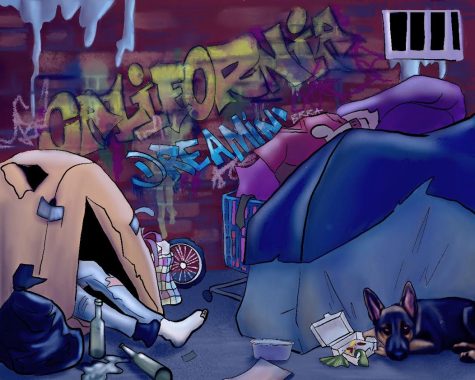
Turns out he didn’t end up having a place to stay. This would be the first time he started living out of his truck. I found out later he would usually keep his truck at “Park & Ride” parking lots.
At first, he stopped working, which was out of the ordinary for him. Then, he spent all the money he had left.
One day, I called his phone and a random person answered. They told me that someone had sold them the phone for $20.
About a week later, an unknown number called my phone. It was Randy. In a low, raspy voice he asked to borrow money. I reminded him how I had previously loaned him money but would buy him some food if needed.
“I’ll call you right back,” he said after a pause. But that call never came. The silence lasted for weeks then months.
I found out that Randy had gotten arrested and was facing a lofty sentence because he was being charged with a violent felony. The sentence was eventually reduced but he still received about eight months in the Twin Towers Correctional Facility in Downtown LA.
When he was finally released, it was like we had the old Randy back. He was sober with mental clarity from his time in jail, had gained muscle mass from working out while incarcerated, and to top it all off, he was now reborn after finding religion.
During that time, he told me some of the stories of living on the streets. He told me about the endless nights he spent strung out walking around, constantly moving to stay warm. He told me how sometimes he would get high and then just walk for days on end not having any idea what he was doing until he came down.
He explained how, at the time of his arrest, he was so far gone from his mind that he was hearing voices that he attributed to the devil.
I remember the sincerity in his voice when he said he never wanted to go back to living like that. To this day, I truly believe he meant it at that time and a part of him still believes that.
The positive changes after his release didn’t last long. It wasn’t more than a few months before the same patterns started.
His cell phone was sold. He disappeared for weeks on end.
Then, he was finally gone again, lost on the street.
After this, he spent another lengthy period of time bouncing back and forth between rehab facilities, sober living, incarceration and living on the streets.
It had been years since the last time Randy checked out of a rehab facility and months since the last time I saw him on the streets.
He remained relatively out of trouble to this point but still refused to get any treatment, so he still deals with substance abuse, malnourishment and is homeless.
Months later as I am sitting in the parking lot of a grocery store on a weekday, I look up to see employees shouting and chasing out of their store what looks like a weak shriveled old man.
I was completely shocked when I realized that the decrepit-looking person was my old, close friend.
The employees followed him to the edge of the parking lot. One of them pointed down the street and said, “Get the hell out of here you junkie, get some help man!”
I went into the grocery store that he was chased out of and bought a turkey sandwich and a water bottle. While I waited in line, I heard the cashiers and manager talking about how that homeless guy always tries to sneak in to steal things.
I drove up the street where I found Randy just to the side of a drive-through pickup window asking for spare change.
I slowly approached him, and he didn’t seem to notice me until I was about 6 feet away. He is now hunched over permanently from what could be a back issue. His arms were severely scratched, scarred and still bleeding from fresh wounds.
He looked up and greeted me right away as I handed him the water and sandwich. I was shocked when he quickly asked me how work was going and how my dogs were doing before I could even ask him anything. There’s still a sign of some type of cognizance in there.
When I asked if he needed anything, he said he could use some new clothes and that he wanted to call his family. So I drove a few blocks away to grab a duffel bag from home and stuffed it with some old clothes, a toothbrush, toothpaste, bandaids, disinfectant wipes and some extra towels.
When I got back, he gladly accepted the bag of supplies and thanked me as he stuffed the sandwich and some burritos people had just given him inside the duffle bag. I pulled my phone out and said, “If you need to make a phone call, then you can use my phone.”
He paused and glanced down at the phone and quickly shook his head back and forth. Randy had changed his mind.
We talked back and forth for a few minutes before I asked him if he was ready to get any help yet. I asked him if he wanted to keep living like this.
He started to shake his head no, and then said, “No I don’t want to keep living like this, I just need to get back to work.”
When I tried to tell him he had to get some kind of help to get back to working, he started shaking his head back and forth faster in a more fidgety manner.
“No I can’t,” Randy said more erratically now. “I’m just busy right now. I have something I need to do and I can’t waste my time in rehab again.”
I didn’t want to openly question anything he was saying, but it really just wasn’t making sense. When he picked up his bag and motioned toward the street, I solemnly realized he wasn’t having any revelations today.
I told him to take care, moved forward and hugged the skeleton-like frame of my old friend. I stepped back and he looked down at the ground as I told him there were people out there that still loved him and were here to help when he wanted it.
He glanced up from the side of his eye, mumbled thanks to me, and then we both said our goodbyes. I wished him luck and told him to please be safe.
I watched from my vehicle as he walked down the street with the duffel bag full of supplies.
That day, he, unfortunately, made another decision to still stay on the same path and continue to suffer from homelessness.
I saw him again in passing the next day and his duffel bag appeared to be missing already.
Until this friend detoxes and attends an extensive treatment program, I really fear he may never make the decision to seek further help and better his life.
If he never makes that decision, I worry that things will only continue to get worse until it is too late.
This person wasn’t always like this. He was once a bright positive soul. He had a fire in his eyes and a hunger for life that, at one point, couldn’t be matched.
This is a brother, son, cousin, nephew and friend who is still out there. He is lost and wandering to this day, unable to find a way out of this downward spiral.
Every day I pray that I will hear the good news that he has checked into treatment or has finally accepted the help he has been offered.
Now, whenever I see another person struggling through homelessness and in the depths of a substance use disorder, I think about how that person is somebody’s relative or a best friend at one point. They were once on a journey through life pursuing their own goals and aspirations. At one point they may have even been surrounded by friends and family, but now they spend most of their days battling a war on their own.
The story of Randy isn’t that uncommon for some people who end up suffering from homelessness.
In the 2022 Annual Homeless Assessment Report in California, it states that approximately 64% of those chronically homeless who were reported as “Unsheltered” also simultaneously suffered from chronic substance use.
“Mental health issues that homeless people face often lead to self-medication. Some people use alcohol or street drugs, which can lead to addiction,” Addiction Group explained in an article. “When someone becomes homeless, they are automatically at risk for drug and alcohol use. Some people use these substances to dull the pain that comes with living on the street. For some people, drugs and alcohol act as a coping mechanism and a way to escape their reality.”
However, substance use is not the only story of everyone who ends up suffering from homelessness.
There are those who end up unsheltered due to personal choices, unemployment, domestic situations, bad luck, tragedies or unfortunate circumstances.
People who desperately want to get back on their feet and be stable again. They have been dealt a bad hand by life and are looking to get through their situation any way they know how.
John is another friend of mine who has been struggling with homelessness for the last six months but reached this place in life in a very different manner than Randy.
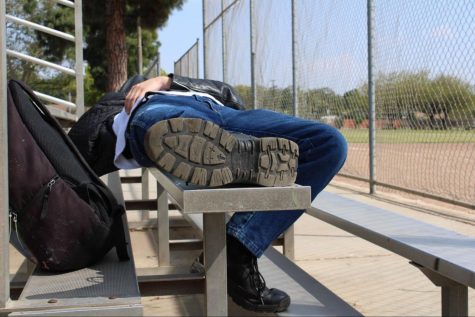
John is a 29-year-old musician from the SGV who has spent much of his youth playing music in the underground scene and working local jobs. We met through performing in a band together, and I was actually first introduced to John when Randy was at the very beginning of his downward spiral.
He described his current living situation as his own choice. Although he said he was pushed to make this decision because he had no other options.
After losing his job, John became stuck in a living situation where the person who had offered to help him get back on his feet, changed their mind and started demonstrating abusive behavior.
Referring to his previous roommate’s behavior, John said, “What also led to an issue was he was an alcoholic, he would drink to the point where he would be abusive, insulting and he would be cussing me out at 3 in the morning.”
John was fed up with the psychological abuse and being berated at the place he lived, so he made the decision to leave on his own.
Without a job and with all his possessions in hand, John hit the streets, certain in the back of his mind that anything would be better than the torment he was forced to endure day and night.
“My first night I didn’t really have anything but all my stuff in bags. You know the first thing I had to try and do was find somewhere I could be,” John said. “I had nowhere to go, nothing to do and I slept in the cold.”
John specified that he found shelter on some nights but has spent the majority of his time homeless living on the streets.
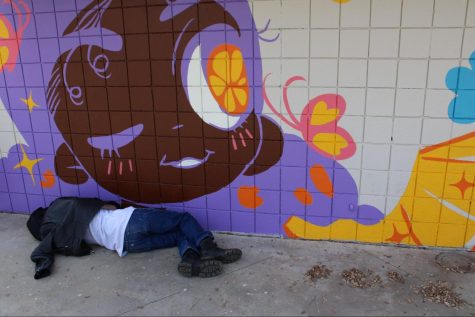
“I don’t want to give people the impression that I’m taking advantage of them,” he said. “I don’t want to be overstaying my visit, I want to be respecting my boundaries with people.”
With a more positive outlook, John reflected on how grateful felt for anyone who had offered him shelter and that he always offered to do housework to repay them.
Though a helping hand isn’t always available, John explained. Most of the time, being on the streets is a dark and lonely path where you feel like your back is up against the wall.
When asked about some of his biggest fears with staying on the street, he listed getting attacked at the top of his list. Since he usually stays in close proximity to the foothills, he explained that he must always be on guard for coyotes and other animals that might approach him.
“Twenty-four hours of the day of being homeless, you have to look out for yourself. You can never really trust anyone. Even though you may find people in the absolute [same] situation you are,” John said. “Some people are just trying to hurt others.”
Besides animals, John said he is wary of others living on the street and keeps his distance out of dread that they might attack or ambush him.
One night as John tried to fall asleep near the side of a building, he felt so exhausted he could barely keep his eyes open, but at the same time heard someone rummaging through his belongings. He unzipped from his sleeping bag and stood up. The person scurried off into the night, but since then, he’s learned to sleep with one eye open.
On rare nights, John said he has even fallen asleep with his knife grasped tightly in his hand for extra security while he tries to get rest in a spot he feels could potentially be unsafe.
Dealing with varying types of weather ranging from rain to extreme heat was also another thing John mentioned as a consequence of homelessness.
There are some days when securing food is harder than others. On these days, John says he finds any means to secure food. He will go to churches or shelters offering free food, and sometimes resorts to asking strangers on the street for food or spare change.
The dangers of being unsheltered aren’t always external though. Dealing with mental health when you feel like your back up against the wall can be daunting.
“It can be very depressing, It can be very lonely. You get the thought you don’t know what to do with yourself and you don’t know where to go, so you ask yourself where to go. You always have questions you can’t answer,” John said. “You have to make your own answers, figure out your own way and make your own path.”
“Depending on how you go about it, you don’t want to destroy yourself, you don’t want to end up crazy and you don’t want to go insane,” John said. “Some people can’t really keep their mind together, and another list of fears is I don’t want to end up like that myself one day … with ongoing homelessness.”
Despite all the hardships he continues to face on the streets, John tries his best to still stay positive.
Today, he is focused on getting back on his feet by first establishing shelter and working out an ongoing case he has with the Department of Public Social Services regarding a halt to his General Relief. John dreams of a stable life where he can break away from homelessness and grow.
“I think the best thing for me to do is go to college or find a job. Start saving up. Go to school,” he said. “Try to find a way to fix the situation that I’m in, better myself every day.”
While it might be easy for some people to pass judgment on those who are stuck on the streets, my hope is that these stories ultimately humanize those struggling with homelessness. John said that he frequently feels he is judged negatively by people for being in his situation, even though he is doing what he can to get back on track.
It might be easy to think that this type of situation will never happen to you, but truly a series of tragic events could put any of us on a similar path
A lost source of income or layoffs due to the economy. A poor personal decision. A simple string of bad luck.
Consider that according to a report from Lending Club in May 2022, 64% of Americans are living paycheck-to-paycheck. That means that approximately 166 million adults are left with only enough to pay their minimal bills and expenses. An unfortunate circumstance that unexpectedly arises could derail someone’s entire life.
Hopefully, this never becomes a reality for anyone, but if by some chance you do end up down on your luck, John has offered up some advice from his experiences so far.
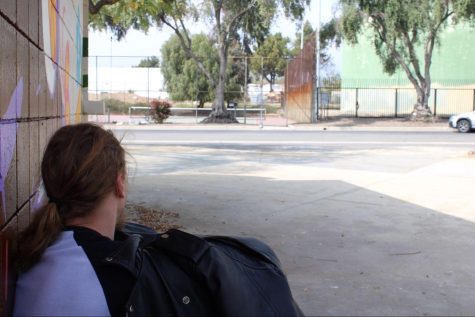
“If you ever find yourself homeless, try to stay warm, travel light and have a backpack. Find a way to get a hold of a sleeping bag and a little rubber mat. Find somewhere to stash your belongings safely,” John said. One of the most important things he added was just finding a safe place to sleep at night and utilizing available resources in your local area.
John’s story and aspirations give me hope – hope for him and others just like him, especially in the wake of Randy’s story. I pray that Randy’s story can be a cautionary tale for those reading this and that no one has to experience the depth of his suffering.
If you know someone who is suffering from homelessness try to reach out to available resources to help them.
If someone you know is suffering from homelessness and substance use disorder, please reach out to those resources before it is too late.
For John, and even for Randy, there is still hope for a better future. These are just two out of countless people who suffer from homelessness and possess two very real and very different stories.
Check up on your friends, family and loved ones. We are all in this together.




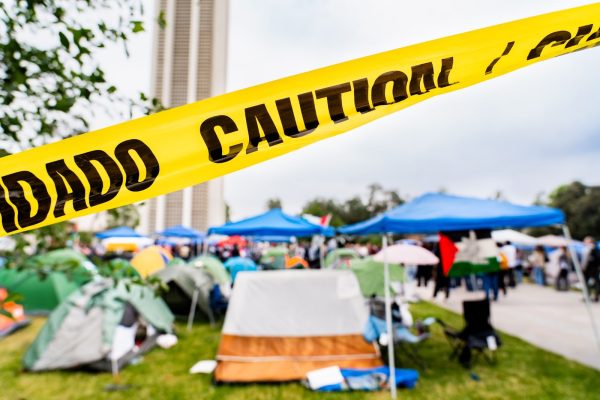







Greg Olson • Feb 13, 2024 at 1:44 pm
I think that the way people today look at the ones trying makes me sick to see even one person talk bad about another! but thats life in todays, way of thinking. And the only way it will ever change is when
the drugs stop being the problem. People can help people thats the
real answeer.
Sam • Aug 1, 2023 at 7:01 pm
Thank you so much for writing this article, it was very insightful and empathetic. As someone who has personally experienced homelessness, I feel passionate about others who are going through the same struggle. I really hope John and Randy find their way to a place of stability and peace.